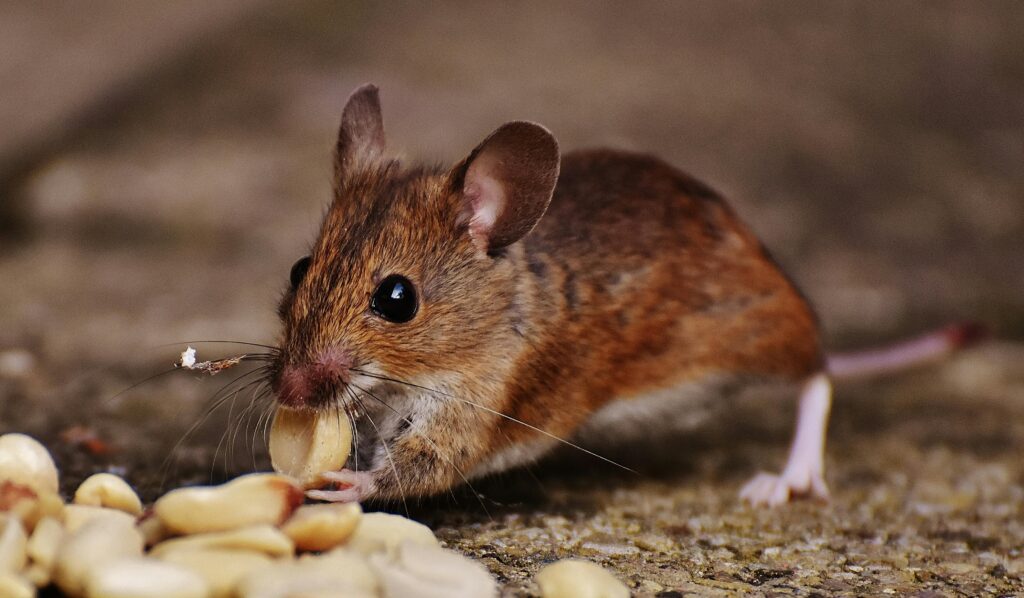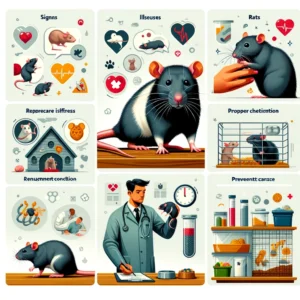Understanding the Nutritional Needs of Pet Rats: A Guide to Balanced Diets
Pet rats, with their playful antics and curious nature, make delightful companions for many animal lovers. However, ensuring their well-being goes beyond providing a cozy cage and ample toys; it extends to their dietary needs. Just like any other animal, rats require a balanced diet to thrive. In this comprehensive guide, we delve into the intricacies of what constitutes a healthy rat diet and how to ensure your furry friends receive the nutrition they need.
1. The Basics of Rat Nutrition:
Rats are omnivores, meaning they consume both plant and animal matter. In the wild, their diet includes seeds, grains, fruits, vegetables, insects, and occasionally small animals. As pets, replicating this varied diet is crucial for their health and happiness. A balanced rat diet typically consists of:
- Protein: Essential for growth, muscle maintenance, and overall health. Sources include lean meats, cooked eggs, and insects like mealworms or crickets.
- Carbohydrates: Provide energy for daily activities. Rat-safe grains like oats, barley, and brown rice are excellent options.
- Fats: Important for maintaining healthy skin and coat, as well as providing concentrated energy. Small amounts of unsaturated fats from sources like nuts and seeds are beneficial.
- Vitamins and Minerals: Essential for various bodily functions. Fresh fruits and vegetables provide a wealth of vitamins and minerals, particularly vitamin C, which rats cannot produce on their own.
2. The Importance of Variety:
Just like humans, rats benefit from a diverse diet. Offering a variety of foods ensures they receive a wide range of nutrients and helps prevent boredom. Rotate different fruits, vegetables, grains, and protein sources to keep mealtime interesting and nutritionally balanced. Aim for at least 20 different types of food over the course of a month to ensure nutritional adequacy.
3. Rat-Safe Foods:
While rats can eat many of the same foods as humans, there are some exceptions and considerations. Safe foods for rats include:
- Fresh fruits: Apples, bananas, berries, melons, and grapes (seedless).
- Vegetables: Broccoli, carrots, spinach, kale, peas, and bell peppers.
- Grains: Cooked pasta, rice, oats, and quinoa.
- Proteins: Cooked chicken, turkey, eggs, and small amounts of cooked lean meat.
- Nuts and Seeds: Small amounts of unsalted nuts and seeds like almonds, pumpkin seeds, and sunflower seeds.
Always wash fruits and vegetables thoroughly to remove any pesticides or harmful bacteria before offering them to your rats. Additionally, avoid feeding them foods that are toxic to rats, such as chocolate, caffeine, onions, and citrus fruits.
4. Hydration:
Water is essential for maintaining proper bodily functions in rats. Ensure your pets have access to fresh, clean water at all times. Use a water bottle attached to the cage to prevent spills and contamination.
5. Commercial Rat Diets:
Commercial rat pellets can serve as a convenient base for your rat’s diet. Look for high-quality pellets specifically formulated for rats, as these typically contain a balanced mix of nutrients. However, pellets should not be the sole component of their diet; supplement them with fresh foods to ensure variety and additional nutrients.
Conclusion:
Understanding and meeting the nutritional needs of your pet rats is essential for their health and well-being. By providing a balanced diet that includes a variety of fresh fruits, vegetables, grains, and proteins, you can ensure your furry friends lead happy and healthy lives. Remember to consult with a veterinarian experienced in small mammal care for personalized dietary recommendations based on your rat’s age, health status, and individual needs. With proper nutrition, you can help your pet rats thrive and enjoy their company for years to come.
Safe and Healthy Options: Exploring the Best Foods for Pet Rats

Pet rats are not just adorable companions; they’re also intelligent creatures with specific dietary needs. Providing them with a balanced diet is crucial for their overall health and well-being. While commercial rat pellets serve as a good base, incorporating fresh foods into their diet adds variety and essential nutrients. In this comprehensive guide, we’ll explore the best foods for pet rats, ensuring they receive the nutrition they need to thrive.
1. Fresh Fruits and Vegetables:
Including fresh fruits and vegetables in your pet rat’s diet is essential for providing them with essential vitamins and minerals. Some excellent options include:
- Leafy Greens: Rats enjoy leafy greens such as kale, spinach, and Swiss chard. These are rich in vitamins A, C, and K, as well as calcium and iron.
- Bell Peppers: Bell peppers are not only colorful but also packed with vitamin C, which is crucial for a rat’s immune system.
- Broccoli: This cruciferous vegetable is a good source of fiber, vitamin C, and antioxidants, promoting digestive health and overall well-being.
- Berries: Blueberries, raspberries, and strawberries are excellent treats for rats. They’re low in sugar and high in antioxidants, supporting a healthy immune system.
2. Whole Grains:
Whole grains are an important component of a rat’s diet, providing energy and essential nutrients. Some suitable options include:
- Oats: Oats are a great source of fiber and protein, promoting digestive health and providing sustained energy.
- Brown Rice: Brown rice is rich in complex carbohydrates and B vitamins, supporting energy metabolism and overall health.
- Quinoa: Quinoa is a complete protein, containing all nine essential amino acids. It’s also high in fiber and minerals like magnesium and phosphorus.
3. Lean Protein:
Protein is vital for maintaining muscle mass and supporting various bodily functions in pet rats. Some suitable sources of lean protein include:
- Cooked Chicken or Turkey: Boneless, skinless chicken or turkey can be offered as an occasional treat. Make sure it’s cooked thoroughly and free from seasoning.
- Hard-boiled Eggs: Eggs are a good source of high-quality protein and essential amino acids. Offer them in moderation as a protein-rich snack.
4. Healthy Treats:
In addition to their regular diet, it’s important to provide rats with occasional treats. Opt for healthy options such as:
- Nuts and Seeds: Rats enjoy nuts and seeds in moderation. Almonds, pumpkin seeds, and sunflower seeds are nutritious choices.
- Dried Fruits: Dried fruits like raisins, cranberries, and apricots can be offered as occasional treats. Ensure they’re free from added sugars and sulfites.
5. Hydration:
Water is essential for maintaining hydration and supporting various bodily functions in pet rats. Ensure they have access to fresh, clean water at all times. You can provide water in a sipper bottle attached to the cage to prevent spills and contamination.
Conclusion:
Providing your pet rat with a balanced diet that includes a variety of fresh foods is key to their health and happiness. By incorporating the best foods for pet rats into their diet, you can ensure they receive the essential nutrients they need to thrive. Remember to introduce new foods gradually and monitor your rat’s health and appetite regularly. With proper nutrition and care, your pet rat can live a long, healthy life by your side.
Crafting a Varied Diet: Tips for Ensuring Nutritional Diversity in Rat Food
Introduction:
When it comes to keeping pet rats healthy and happy, providing a varied diet is paramount. Just like humans, rats require a diverse range of nutrients to thrive and maintain optimal health. Crafting a varied diet for your pet rats not only ensures they receive essential vitamins and minerals but also keeps them mentally stimulated and interested in their meals. In this article, we’ll explore the importance of nutritional diversity in rat food and provide practical tips for achieving it.
Understanding the Nutritional Needs of Pet Rats:
Before delving into crafting a varied diet for pet rats, it’s essential to understand their nutritional requirements. Rats are omnivores, which means they need a combination of protein, carbohydrates, fats, vitamins, and minerals to stay healthy. Their diet should consist of high-quality proteins, such as lean meats, as well as complex carbohydrates, fresh fruits, and vegetables.
The Importance of Varied Diets:
Providing a varied diet is crucial for several reasons. Firstly, it helps prevent nutrient deficiencies by ensuring rats receive a wide range of essential nutrients. Secondly, offering different types of food keeps mealtime exciting for rats, preventing boredom and promoting mental stimulation. Additionally, a varied diet mimics the diversity of foods rats would encounter in the wild, contributing to their overall well-being.
Tips for Crafting a Varied Diet:
- Include a Variety of Fresh Foods:
Incorporate a mix of fresh fruits and vegetables into your rat’s diet. Examples include leafy greens like kale and spinach, carrots, broccoli, apples, bananas, and berries. Rotate these options regularly to provide a diverse array of nutrients. - Offer High-Quality Protein Sources:
Protein is essential for muscle growth and maintenance in rats. Offer lean sources of protein such as cooked chicken, turkey, eggs, and low-fat cottage cheese. Avoid feeding them processed meats or those high in salt and fat. - Introduce Whole Grains:
Whole grains are an excellent source of carbohydrates and fiber for rats. Consider adding small amounts of cooked grains like brown rice, quinoa, or oats to their diet. These grains provide energy and promote digestive health. - Provide Nutritious Treats:
Treats can be an enjoyable addition to your rat’s diet, but they should be given in moderation. Opt for healthy treats such as small pieces of plain, unseasoned cooked meat, unsalted nuts, or small amounts of cheese. Avoid sugary or fatty snacks that can lead to obesity and other health issues. - Supplement with Commercial Rat Food:
While fresh foods should form the basis of your rat’s diet, commercial rat pellets can provide essential nutrients and serve as a convenient supplement. Choose a high-quality rat food that is specifically formulated to meet the nutritional needs of pet rats. - Ensure Clean, Fresh Water:
Hydration is key to a rat’s health. Always provide your rats with access to clean, fresh water. Consider using a water bottle attached to the cage to prevent spills and contamination. - Monitor Their Health:
Keep an eye on your rats’ overall health and behavior. If you notice any changes in appetite, weight, or activity levels, consult a veterinarian promptly.
Conclusion:
Crafting a varied diet for pet rats is essential for ensuring they receive the nutrients they need to thrive. By incorporating a diverse range of fresh foods, high-quality protein sources, whole grains, and nutritious treats, you can provide your rats with a balanced and enjoyable diet. Remember to monitor their health closely and consult a veterinarian if you have any concerns. With proper nutrition and care, your pet rats can lead happy and healthy lives.
Avoiding Hazards: Foods to Steer Clear of When Feeding Pet Rats
Pet rats are delightful companions known for their inquisitive nature and unique personalities. Proper nutrition is paramount to ensure their health and well-being. While rats have relatively flexible diets, there are certain foods that can pose serious risks to their health. As responsible rat owners, it’s crucial to be aware of these potential hazards and avoid them altogether. In this comprehensive guide, we’ll explore the foods that should be kept out of your pet rat’s diet to ensure their safety and longevity.
1. Citrus Fruits:
While citrus fruits like oranges, lemons, and grapefruits are packed with vitamin C and other nutrients beneficial to humans, they can be harmful to pet rats. Citrus fruits are highly acidic and can cause digestive upset and mouth sores in rats. Additionally, the essential oils found in citrus peels can be toxic to rats if ingested in large quantities. It’s best to steer clear of feeding citrus fruits to your pet rat to avoid potential health issues.
2. Raw Beans:
Raw beans, including kidney beans, navy beans, and black beans, contain lectins and enzyme inhibitors that can be toxic to rats. Consuming raw beans can lead to gastrointestinal distress, including bloating, gas, and potentially life-threatening conditions such as intestinal blockages. To ensure the safety of your pet rat, always cook beans thoroughly before offering them as a treat.
3. Raw Sweet Potatoes:
While cooked sweet potatoes can be a nutritious addition to your pet rat’s diet, raw sweet potatoes contain compounds called trypsin inhibitors that can interfere with digestion and nutrient absorption. In addition, raw sweet potatoes may harbor harmful bacteria that can cause food poisoning in rats. It’s essential to cook sweet potatoes thoroughly before serving them to your pet rat to eliminate these risks.
4. Sugary and Fatty Foods:
Foods high in sugar and fat, such as candy, chocolate, cookies, and fried foods, should be strictly avoided when feeding pet rats. Rats are prone to obesity and related health problems, including diabetes and heart disease. Feeding sugary and fatty foods can contribute to weight gain and other serious health issues. Instead, opt for nutritious, low-fat treats like fresh fruits, vegetables, and whole grains to keep your pet rat healthy and happy.
5. Processed Foods:
Processed foods, including chips, crackers, and other packaged snacks, are loaded with salt, preservatives, and artificial additives that can be harmful to pet rats. These ingredients can disrupt their delicate digestive system and lead to health problems over time. Stick to natural, whole foods whenever possible to provide your pet rat with the nutrition they need to thrive.
6. Almonds:
While nuts can be a healthy snack for humans, almonds contain a compound called cyanogenic glycosides, which can release cyanide when ingested. Even small amounts of cyanide can be toxic to rats and can cause symptoms such as difficulty breathing, weakness, and seizures. It’s best to avoid feeding almonds to your pet rat to prevent potential poisoning.
Conclusion:
As responsible pet owners, it’s our duty to provide our furry friends with a safe and nutritious diet. By avoiding these hazardous foods and opting for wholesome alternatives, you can help ensure the health and well-being of your pet rat. Always consult with a veterinarian or experienced rat breeder if you have any questions or concerns about your rat’s diet. With proper care and attention to their nutritional needs, your pet rat can live a long, happy, and healthy life by your side.
Feeding Strategies: Practical Tips for Ensuring Optimal Nutrition and Enjoyable Meals for Pet Rats

Pet rats, beloved for their intelligence and affectionate nature, require a balanced diet to thrive. As a conscientious rat owner, understanding the intricacies of their nutritional needs and implementing effective feeding strategies is crucial. This comprehensive guide aims to provide practical tips to ensure optimal nutrition and enjoyable meals for your pet rats.
1. Understanding the Nutritional Requirements of Pet Rats:
Before delving into feeding strategies, it’s essential to grasp the basic nutritional needs of pet rats. Rats are omnivores, meaning they require a mix of protein, carbohydrates, fats, vitamins, and minerals for optimal health. A well-rounded diet should consist of high-quality rat pellets, fresh fruits, vegetables, grains, and occasional lean protein sources.
2. Quality Rat Pellets as a Foundation:
Rat pellets serve as the foundation of your pet rat’s diet. Opt for high-quality, nutritionally balanced rat pellets specifically formulated for rats. These pellets provide essential nutrients and ensure that your pet receives a consistent and complete diet. Avoid mixes that allow rats to pick and choose, as they may lead to imbalanced nutrition.
3. Incorporating Fresh Fruits and Vegetables:
Fresh fruits and vegetables are excellent sources of vitamins and minerals for pet rats. Offer a variety of options such as leafy greens (e.g., kale, spinach), bell peppers, carrots, broccoli, and berries. These foods not only provide essential nutrients but also offer enrichment and variety to your rat’s diet. Remember to wash fruits and vegetables thoroughly and remove any seeds or pits that may be harmful.
4. Introducing Grains and Lean Proteins:
Grains like cooked pasta, rice, and oats can be included in your rat’s diet in moderation. These foods offer carbohydrates for energy and variety in texture. Additionally, lean proteins such as cooked chicken, eggs, and tofu can be offered as occasional treats. However, ensure that proteins are cooked thoroughly and free from seasoning or additives that may be harmful to rats.
5. Monitoring Portion Sizes and Avoiding Overfeeding:
While it’s tempting to indulge your pet rat with treats, it’s essential to monitor portion sizes to prevent overfeeding. Rats have a tendency to hoard excess food, leading to obesity and health issues. Offer small, measured portions of treats and monitor your rat’s weight regularly. Adjust portion sizes accordingly to maintain a healthy weight.
6. Ensuring Hydration:
Water is essential for maintaining your rat’s overall health and well-being. Provide fresh, clean water in a sipper bottle or shallow dish at all times. Check the water supply daily to ensure it’s not contaminated or depleted. Additionally, consider offering water-rich foods such as cucumber or watermelon as a hydrating snack option.
7. Enrichment through Foraging and Puzzle Feeders:
Make mealtimes engaging and enriching for your pet rats by incorporating foraging and puzzle feeders. Scatter food around their enclosure or hide treats inside puzzle toys to encourage natural foraging behaviors. Not only does this provide mental stimulation, but it also promotes physical activity and prevents boredom.
8. Avoiding Harmful Foods and Substances:
Certain foods and substances can be harmful or toxic to pet rats. Avoid feeding your rats chocolate, caffeine, sugary treats, and foods high in salt or fat. Additionally, steer clear of foods that are toxic to rats, such as avocado, citrus fruits, raw beans, and rhubarb. Always research new foods before offering them to your pets to ensure they are safe for consumption.
Conclusion:
Feeding strategies play a pivotal role in ensuring the health and happiness of your pet rats. By understanding their nutritional requirements and implementing practical tips such as offering quality rat pellets, fresh fruits and vegetables, and monitoring portion sizes, you can provide your rats with a balanced diet that meets their needs. Remember to prioritize variety, hydration, and enrichment to create enjoyable meals that keep your pet rats healthy and thriving.




